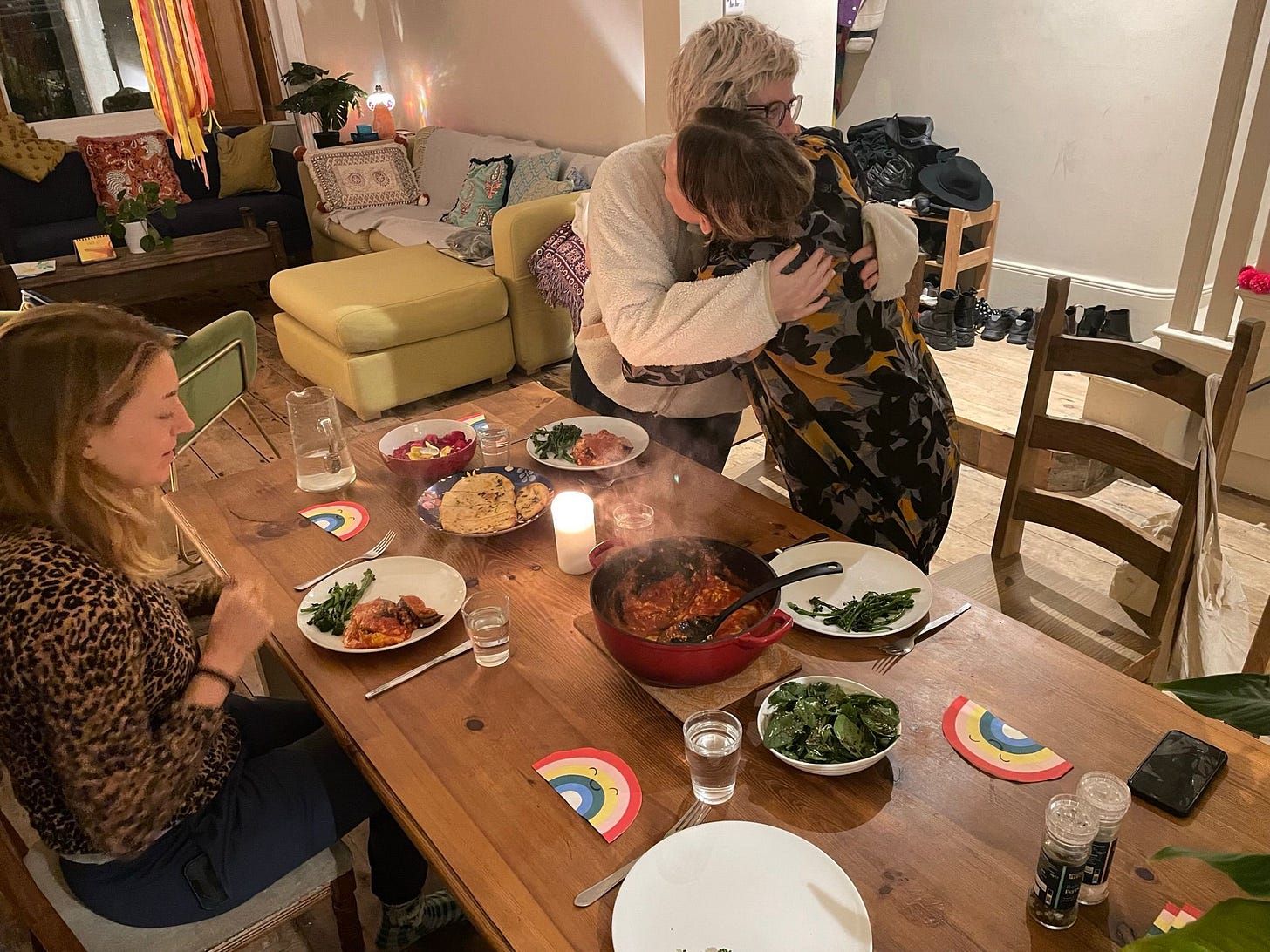Do you practise Conversational Consent?
Hello Carousellers,
The other day I went into the kitchen after having a bit of a depressing look at my finances. I was feeling anxious so I started sharing with my housemate what was on my mind. We were both pottering around the kitchen so I wasn’t really looking at her. When I sat down to face her I realised she looked a bit shell-shocked.
‘Sorry, is it okay to talk about this?’
‘I’m actually feeling quite triggered by this conversation…’
I’d launched in without checking whether she had capacity, or whether it was something that was okay to share at all.
This is something I’ve been thinking about a lot recently: the idea of Conversational Consent.
As a society we’re (mostly) much better about consent regarding touch and personal space these days, but we don’t always have the language around the things we TELL each other.
When we share personal things or introduce topics, we are bringing a certain energy or mood into the space. Some topics are more likely to bring up big emotions for people: things like death, illness, money, pregnancy.
And then there are topics that we may not know are triggering or emotive for that person, because they’re not for us. (For example, I LOVE chatting about careers, purpose and creativity, but someone else might be feeling really stuck and anxious about it, so may not feel in the mood for my cheerleading!)
Look, I’m not suggesting that we go around on edge the whole time checking in ‘is it okay to talk about cheese?’, but I would say that there can be more awareness about the kind of conversations we have, and notice signals from the other person that they don’t feel at ease. Maybe they turn away, or look uncomfortable. Maybe they’re not engaging in the conversation much. Just like with sex when we need an ‘enthusiastic yes’, we want to look for these in conversation before we launch into a big share.
In Conversational Consent (this is a term I’ve come up with, although it may also exist elsewhere / have a different name) both the ‘‘topic introducer’’ and also ‘‘the listener’’ can be the ones to take responsibility for the way the conversation develops.
As the person introducing the topic you may say:
‘Is this a good time to talk about X?
‘Do you have capacity for me to share about X?
‘I’m aware you went through X recently. Would you like to talk about it?’
‘I’m about to send you a voice note about X topic, in case it’s not a good moment to listen.’
‘You’ve gone quiet, would you like to keep talking about this?’
As the listener you may say:
‘Thanks for asking, I’m actually not sure I can today.’
‘Can we park that for another time?’
‘I don’t think I’m the best person to talk to about that at the moment.’
‘I notice I’m feeling quite tense listening to this conversation. Could we change the subject?
‘I can’t do heartbreak chat at the moment! Too raw!’
(Be aware that for some neurodiverse people it can be really hard to not speak impulsively or overshare, so if it isn’t a good moment, we can say that kindly.)
Here’s some examples of Conversational Consent I’ve experienced recently:
A friend asked me ‘do you want to share any more about how you’re feeling about having kids?’ I checked in with myself. ‘Do you know what, I don’t think I do today!’
I loved this because she showed an interest in something that was important to me, but allowed me to choose how deep we went in that moment. I had the chance to pause and consider and not just default end up in a big heavy chat.
My Dad asked me about some work stuff the other day and about finances. He stopped half way through and said ‘do you mind me asking you this? I know that you’ve preferred to keep this private before.’ Again, that good balance between showing an interest, but also giving the other person a chance to opt in/out.
A friend was staying over and brought up a big topic of conversation just before we went to sleep. I said ‘I do want to talk about this, but I can’t do it now. Can we park it for the morning?’
Sometimes the Conversational Consent can be retrospective, but still important to do: A few years ago I ended up in a conversation with someone where they gave me unsolicited advice about my finances and I came away feeling really violated. I was able to share with them afterwards and give the feedback. She’d had the same reflection and we were both able to see how neither of us had taken responsibility for that conversation. She hadn’t checked in / picked up on my very defensive and shut down cues, and I hadn’t felt able to voice ‘I’m not enjoying this!’ going along with the conversation. It was such a huge learning for both of us.
And with my housemate in the situation I mentioned at the start we were able to meet up the next day for a ‘cup of tea in the sky’ (my room has these amazing views of Brighton so it is very conducive to an open conversation). With permission to go into the topic more calmly, I asked her if she wanted to share what had felt triggering so I could understand her better, and she was able to reflect and articulate the nuance of that topic that is hard for her (we often talk about money, but this was a specific slant). It was so great for me to realise how some of the things I’d shared had landed and why it might feel hard to hear.
She then said ‘can I share some stuff around dating?!’ And I was like YES PLEASE DO (again, a topic she’s known that has historically been quite hard for me, but I was all over it that day!)
We both agreed that as much as possible we can check in, AND we’re human and sometimes one of us is going to storm into the kitchen and need to offload. So it’s up to both of us to try and be aware of whether we want to be in that kind of conversation. Both of us can start, pause, postpone and stop a conversation.
There’s also something to be said for the fact that sometimes a conversation is hard to be in but there might be some healing, or nuggets, or fresh perspectives if we can really listen and stay in it. So I’m not suggesting that as soon as a conversation feels hard or triggering that we bolt, but I am saying that we can help each other to choose really good moments to have those difficult conversations. Or that we can choose the right person to have them with. Just an extra dollop of awareness really, with some humanity and forgiveness thrown in on the listener’s end too.
What are your thoughts on Conversational Consent?
Are there certain topics you need a bit more warning about before someone talks about them?
How comfortable do you feel cutting a conversation off if it’s not feeling okay to be in?
What are your warning signs that you’re not comfortable being in a conversation (eg. for me I feel very anxious, stop listening, want to change the subject or leave the room).
I’d love to hear your thoughts in the comments.
The Creative Residence-sea is out in the world!
The community house I’ve set up in Brighton has been featured on a podcast and in a book!
🎧 It was a total pleasure to speak to the incredible Ruth Rogers from The Canvas Cafe about taking a project from a ‘small idea’ to a profiting venture. I share the story of the process I went on to find the house in Brighton (it’s pretty magical). You can listen to the episode here.
📖
featured The Creative Residence-sea in her new book ‘Single’ in the chapter about living with others. It’s so lovely that our community home has been seen as an example of creating the set-up you need! Also happy to be in same chapter as my fellow Brightonian legend . Thanks Nicola for featuring me and good luck with the launch. You can pre-order the book here.One of our yummy house dinners at TCR
Currently on my Carousel:
Running leadership workshops at PwC (something I’ve done every year since 2018. They are my ideal client and I love it!)
Enjoying the absolutely delicious mix of winter swimming + sunset + sauna (and even + full moon + murmuration the other day!) I LOVE living by the sea at this time of year.
Coaching Teachers and getting them through the longest and hardest term of the year.
Helping 1:1 coaching clients design Beautiful Endings for chapters in their life (I ADORE this work and it feels like such a priviledge to accompany people through these threshold moments).
Writing an ABBA MEDLEY for Day of Musical Joy, and finding the joy of weaving the songs together with my co-host Sophie A.
That’s all this week, folks. Thanks for being here and if you’re going to see Wicked, ENJOY. I’ve heard it’s Pop-u-larrrrr.
Sarah x
If you’re new here, Carousel is a way of showing up to your life by honouring what feels most alive.
Here’s 2 things from my Carousel from my decade of working in this way (I change these every issue).
📺 I love writing medleys and have been running a community event at my home called Day of Musical Joy since 2019 (this has now morphed into a 90/00s Piano Singalong that we do at festivals and weddings). This is one of my favourite medleys - SELF ESTEEM - which she ended up sharing on her feed!
🎧 I’ve spoken on various podcasts over the years (since 2016) and have put them all in a Spotify playlist.
I think audio dialogue is where I express myself the best, so these are definitely a good way of getting stuck into some of my ideas and concepts, if you’re wanting to work in a Carousel way.
One of my favourites was speaking on ‘Properly Freelance’ about Imposter Syndrome, where I, very poetically, wondered if I was qualified enough to talk about Imposter Syndrome (!)




What a joy to land in my inbox and thanks for the generous compliment 😆
I love the idea of conversational consent and checking in and also being human and feedback and growth. Big love to my fellow Brightonian legend ❤️ xxx